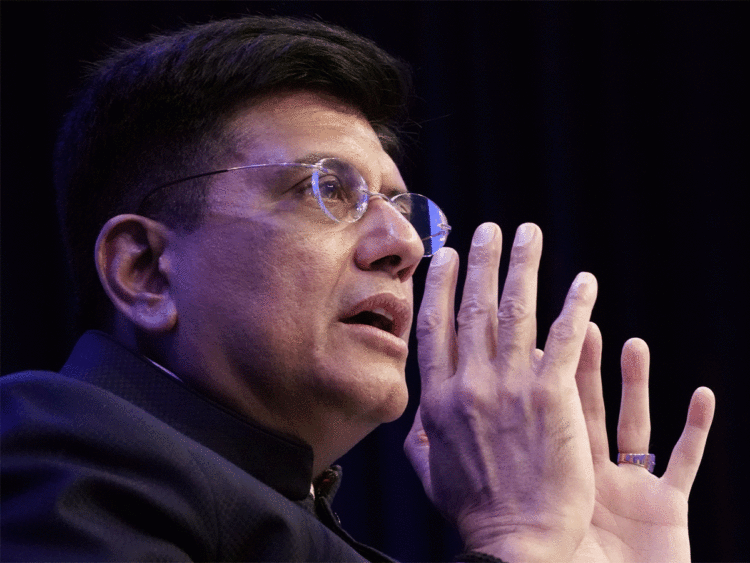The Indian growth story has been accepted globally
NEW DELHI (India CSR): Commerce and Industry Minister Piyush Goyal has announced that in the last few months alone, foreign investors have unveiled plans to invest over Rs. 50,000 crore in India’s finance and banking sectors — a strong testament to the country’s economic resilience and investor confidence amid global uncertainty.
Amidst geopolitical turbulence and market volatility across the world, the minister described India as an “oasis for investments”, emphasizing that the country has firmly established itself as a preferred global investment destination.
“In the last few months itself, investors from all over the world have announced plans to invest over Rs. 50,000 crore in India’s finance and banking sector,” Goyal stated in a post on X.
Government data shows that FDI in India rose by 15% to USD 18.62 billion (Rs. 1.55 lakh crore) during April–June FY26, with inflows from the United States nearly tripling to USD 5.61 billion during the same quarter — a clear indicator of rising global confidence in India’s economic fundamentals.
***
From Dubai to Tokyo: The World Bets Big on Indian Banks
India’s banking sector has emerged as one of the hottest destinations for global capital, attracting nearly $15 billion (Rs. 1.25 lakh crore) in deals this year alone. According to Bloomberg, global investors are shifting focus from Western economies to India’s fast-growing financial landscape.
***
Emirates NBD Leads the Way with Record $3 Billion Investment in RBL Bank
The most prominent deal driving this surge is Dubai-based Emirates NBD Bank PJSC’s $3 billion (Rs. 26,850 crore) investment to acquire a 60% stake in RBL Bank Ltd — the largest-ever foreign direct investment in India’s banking sector.
This landmark transaction — cleared by the boards of both banks — will be executed via a preferential share issue, making RBL Bank the first profitable Indian bank to be majority-acquired by a foreign institution.
RBL Bank CEO R. Subramaniakumar welcomed the development, saying: “The Indian growth story has been accepted globally. A stable financial system and robust regulators make India an attractive market for global investors.”
This move positions Emirates NBD as a major player in India’s retail and digital banking space and reflects the growing strategic importance of Indian financial institutions in the global investment landscape.
***
Global Capital Follows: Japan and Abu Dhabi Join the Race
The RBL deal has set off a chain reaction across Asia.
- Abu Dhabi’s International Holding Co. PJSC has signed a $1 billion investment in Sammaan Capital Ltd.
- Japan’s Sumitomo Mitsui Financial Group (SMFG) recently agreed to acquire a 20% stake in Yes Bank Ltd. for $1.6 billion.
- Talks are also underway between Mitsubishi UFJ Financial Group and Shriram Finance Ltd. for a strategic stake purchase.
Collectively, these high-value deals amount to around $15 billion, signaling renewed investor faith in the Indian financial system.
***
Stronger Rules, Stronger Banks
India’s banking sector has undergone a major transformation since the non-performing asset (NPA) crisis nearly a decade ago.
- The government introduced bankruptcy reforms, recapitalised public sector banks, and strengthened governance.
- The Reserve Bank of India (RBI) has tightened credit norms and improved oversight, ensuring financial stability and risk mitigation.
With reforms, digital inclusion, and fintech growth, India’s banks are now not only profitable but also digitally advanced and globally competitive.
***
Market Outlook: Bullish Momentum Ahead
The Nifty Bank Index has surged over 13% in 2025, hitting a record high last week, driven by strong performances from HDFC Bank, ICICI Bank, and Axis Bank.
Analysts predict more large FDI deals in the coming months, including the government’s potential strategic divestment in IDBI Bank, expected to attract global bidders.
“Geopolitical risks have accelerated financial and supply chain shifts, and foreign investors are looking for alphas in stable economies,” said Vivek Ramji Iyer, Partner at Grant Thornton Bharat. “India’s domestic focus and low correlation with the global economy make it a lucrative entry point.”
***







